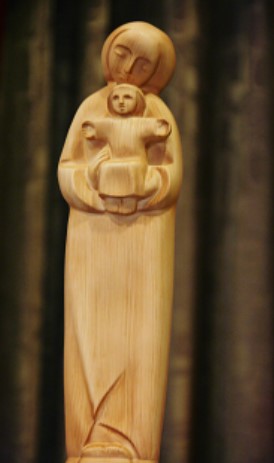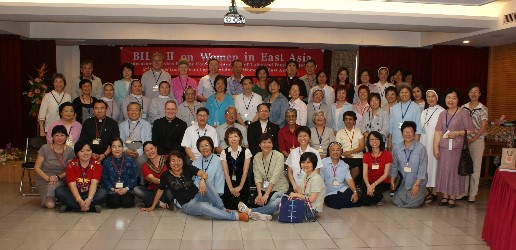By Cora Mateo
The challenge to know and present Mary as a woman, sister, mother, relative, friend and a disciple to our local Churches in Asia in today¡¦s present situation has been the first inspiration to decide in organizing the second BILA (Bishops¡¦ Institute for Lay Apostolate) on Women in East Asia. It is the desire to look at her who in her times had to face many difficult situations and to learn and draw strength from her how to give a faith response as a woman who believed and trusted in God, and who shared her hope that God will continue to do marvels in us and through us.
It has taken some years before BILA II followed BILA I which was held in Hong Kong in 2005 and this was co-organized by FABC Office of Laity and Family ¡V Women¡¦s Desk with the CRBC Commission of Family and the Hsinchu Diocese. We have had our journey with other meetings of women issues in between.

During BILA II, more than 30 official delegates from Hong Kong, Japan, Korea, Macao and Taiwan and around 50 observers from Taiwan gathered at St. Theresa Activity Center, Taoyuan City from May 3rd to 7th to reflect on ¡§Mary, Truly a Woman of Our Times.¡¨ The reflection included the country reports that presented the situation of women in the Church and the society of the 5 countries and talks given by Bishop Luis Antonio Tagle from the Philippines on ¡§Mary, Truly a Woman of Our Times,¡¨ and Sr. Choi Hae Young, RSCJ from Korea on: ¡§Mary, Model of Discipleship in the Church.¡¨ Responses to their talks were given by Sr. Nonie Gutzler, MM, and Prof. Teresa Wong respectively.

The final statement enumerated the challenges the Church in East need to face:
- To model equality and mutual respect in relationships between the sexes, within the Church which affect the way they relate to each other in life.
- To examine the underlying reasons why women in East Asia are choosing not to marry and start a family.
- To empower aboriginal women who marry, have children, live in poverty and suffer domestic violence.
- To support victims of sexual harassment, as well as create awareness on sexuality in the Church for both men and women.
- To denounce gambling, violence to women, mistreatment of foreign workers and the insatiable desire for pleasure.
- To restore the sacredness of women¡¦s bodies and sexuality from its devaluation in popular culture.
- To support immigrant women and their foreign husbands in their integration into local society and the parish.
- To raise awareness of women¡¦s issues through the Small Christian Communities.
The ¡§Magnificat¡¨ was the background song for the BILA II process with its celebration and denouncements. The participants declared that it would include denouncing greed, materialistic values, selfishness, unfaithfulness, violence done to women, to all the weak and wounded in society and to the environment. The Final Statement ended saying: ¡§With the song of Mary¡¦s Magnificat stirring us to action; with the Spirit of God burning in our hearts, we return with expectation and hope and invite the Church in East Asia to consider seriously the challenges and assist in implementing the recommendations, knowing that God is doing great things for us. ¡¨